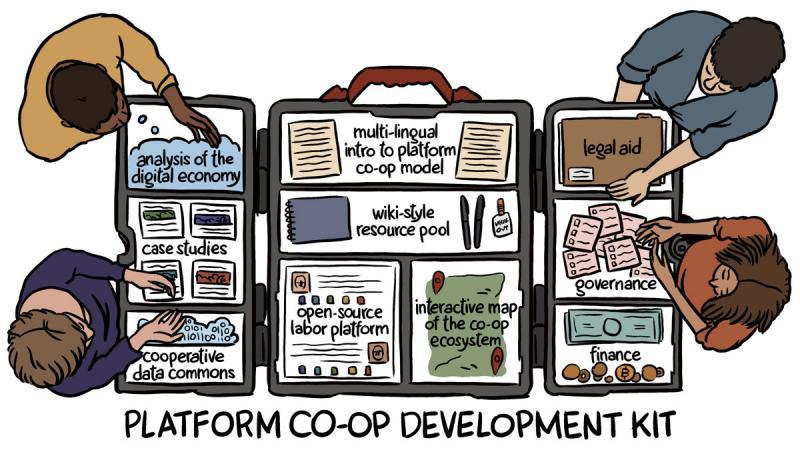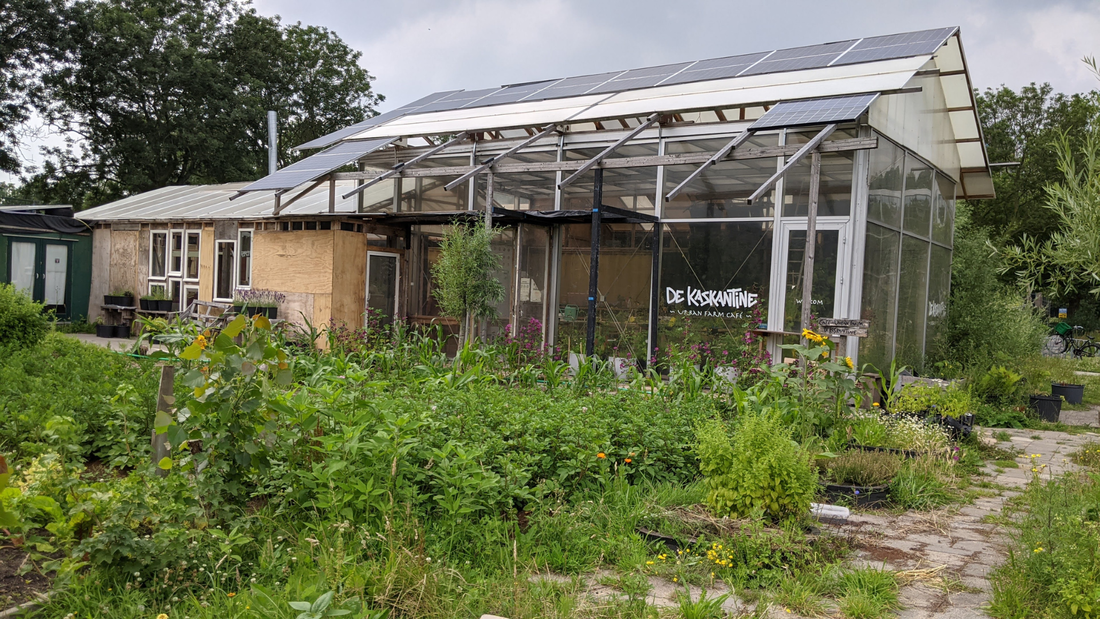 De grote maatschappelijke uitdagingen van vandaag vragen om een andere verbondenheid tussen mensen. Duurzaamheid, sociale ongelijkheid, diversiteit en digitalisering vragen om zelforganisatie en een sterkere lokale economie. Kleinere verbanden zijn belangrijk om deze uitdagingen democratisch en solidair aan te gaan. Overal klinkt de roep om een andere economie: wat voor economie willen we eigenlijk? Tegelijk is er een beweging in de nieuwe economie in opkomst, waarin initiatieven en bedrijven opbloeien die democratisch zijn in eigendom en governance, en waarde creëren voor de buurt of regio. Het democratische en collaboratieve model van de commons is hiervoor vaak een inspiratie. Het is hoog tijd dat overheden, kennisinstellingen en maatschappelijk middenveld de handen ineenslaan om deze sector aan te jagen. In Amsterdam lanceert een brede coalitie van maatschappelijke organisaties daarom vandaag de Startcoalitie voor de opbouw van de Incubator voor de Gemeenschapseconomie. Overal komen nieuwe gemeenschappelijke organisatievormen op, zoals energiecoöps en wooncoöps, of innovatieve praktijken in de zorg en in de wijk. Elders zien we alternatieve bedrijfsvormen opkomen om de macht van grote tech-bedrijven uit te dagen in de vorm van platformcoöps. In deze organisaties worden gemeenschappelijke doelen en waarden verbonden aan economische en maatschappelijke vraagstukken. De incubator voor de gemeenschapseconomie zal burgers, ondernemers en overheden helpen om zich hiervoor te verenigen. Momenteel is er veel bedrijvigheid rondom de nieuwe economie, die democratischer en collectiever is. In de wetenschap, het bedrijfsleven, de politiek, en in het MKB wordt de behoefte gevoeld aan nieuwe vormen van organiseren. Modellen als de coöperatie, holocratie, sociocratie en werknemersparticipatie komen weer op. Op lokale schaal zijn veel succesvolle initiatieven, bijvoorbeeld buurtcoöps. Ook wordt geëxperimenteerd met kredietunies, broodfondsen en social impactbonds. In al die initiatieven staat een emancipatoire werking centraal. De buurt neemt zelf verantwoordelijkheid voor producten en diensten die ze nodig hebben. Veelal worden zaken decentraal georganiseerd en is er naast economische behoeften veel aandacht voor het maatschappelijke en sociale. Maar initiatieven lopen tegen belemmeringen aan: de institutionele kaders zijn er nog niet op ingericht en het ontbreekt bijvoorbeeld aan kennis over collectieve processen, financiering, technische en juridische mogelijkheden en best practices. Het is nodig om deze initiatieven te ondersteunen en de sector aan te jagen. Daarom richten wij de Incubator voor de Gemeenschapseconomie op. We werken met de volgende uitgangspunten: -de incubator werkt met initiatieven die hun organisatiemodel willen democratiseren. Dit gaat om gedemocratiseerd eigendom en governance. -de incubator werkt met initiatieven die hun businessmodel sociaal en regeneratief willen maken, in plaats van winstgedreven en extractief. -de incubator werkt met initiatieven die in hun organisatiemodel en in hun businessmodel waarde voor het lokale en voor de gemeenschap creëren. Hiermee richten we ons op veel verschillende vormen van gemeenschapseconomie in de stad, waaronder ook buurtcommons, energiecoöps en nieuwe stadsbrede ondernemingen. De rechtsvorm van deze samenwerkingsverbanden is belangrijk, maar kan verschillende vormen aannemen mits ze aan de uitgangspunten voldoen. In de incubator werken we samen en gaat het om onderling leren. Allereerst gaat het om een sociaal-culturele verandering en daarmee koerswijziging in wat voor economie we aanjagen: een economie die de gemeenschap dient. De incubator zal een Publiek-Civiele Samenwerking zijn: gemeenschappen en maatschappelijke organisaties trekken de kar maar de overheid heeft steeds ook een eigen rol. Wij zetten ons hiervoor in en gaan nu aan de slag. Hopelijk ook met jou! Commons Network HvA- Center for Economic Transformation Kaskantine 02025 – Oranje Energie Ru Paré StadmakersCoöperatie Waag Launching the Incubator for the Community Economy Today’s major societal challenges requires us to unite and connect. Sustainability, social inequality, diversity and digitalization require self-organization and a stronger local economy. Smaller connections are important to meet these challenges democratically and in solidarity. The call for a different economy is heard everywhere: what kind of economy do we actually want? At the same time, a new economy movement is emerging, in which initiatives and businesses are flourishing that are democratic in ownership and governance, and create value for the neighborhood or region. The democratic and collaborative model of the commons is often an inspiration for this. It is high time that governments, knowledge institutions and civil society join forces to drive this sector forward. That is why today, a broad coalition of civil society organizations in Amsterdam is launching the Start Coalition to Build the Incubator for the Community Economy. New models of collective organisation are emerging everywhere, such as energy co-ops and housing co-ops, or innovative practices in healthcare and in the neighborhood. Elsewhere, we see alternative business forms emerging to challenge the power of big tech companies in the form of platform co-ops. In these organizations, common goals and values are linked to economic and social issues. The community economy incubator will help citizens, entrepreneurs and institutions unite for this purpose. Currently, there is a lot of activity around the new economy, which is more democratic and more collective. In science, business, politics, and in SMEs, the need is felt for new forms of organizing. Models such as the cooperative, holocracy, sociocracy, and worker ownership are re-emerging. There are many successful initiatives on a local scale, such as neighborhood co-ops. Experiments are also being conducted with credit unions, bread funds and social impact bonds. The emancipatory effect is central to all these initiatives. The neighborhood itself takes responsibility for the products and services it needs. Things are often organized decentrally and, in addition to economic needs, much attention is paid to social and societal issues. But initiatives come up against obstacles: the institutional frameworks are not yet geared up for this and there is a lack of knowledge about collective processes, financing, technical and legal possibilities and best practices, for example. It is necessary to support these initiatives and give the sector a boost. That is why we are setting up the Incubator for the Community Economy. We work with the following principles: -the incubator works with initiatives that want to democratize their organizational model. This involves democratized ownership and governance. -the incubator works with initiatives that want to make their business model social and regenerative, rather than profit-driven and extractive. -the incubator works with initiatives that create value for the local and for the community in their organizational model and in their business model. In doing so, we focus on many different forms of community economy in the city, including neighborhood commons, energy co-ops, and new citywide enterprises. The legal form of these partnerships is important, but can take different forms provided they meet the principles. In the incubator we work together and it is about mutual learning. First and foremost, it is about a socio-cultural change and thus change of direction in what kind of economy we are driving: one that serves the community. The incubator will be a Public-Civic Partnership: communities and civil society organizations will pull the cart but the government will also have its own role. We are committed to this and are now getting to work. Hopefully also with you! Commons Network HvA- Center for Economic Transformation Kaskantine 02025 – Oranje Energie Ru Paré StadmakersCoöperatie Waag
0 Comments
|
AuthorMenno Houtstra, founder of the Kaskantine Archives
July 2024
Categories |
How to find Us |
Contact UsContact email: info [at] kaskantine.nl
Read our Privacy policy
|
Kaskantine 2024
 RSS Feed
RSS Feed
